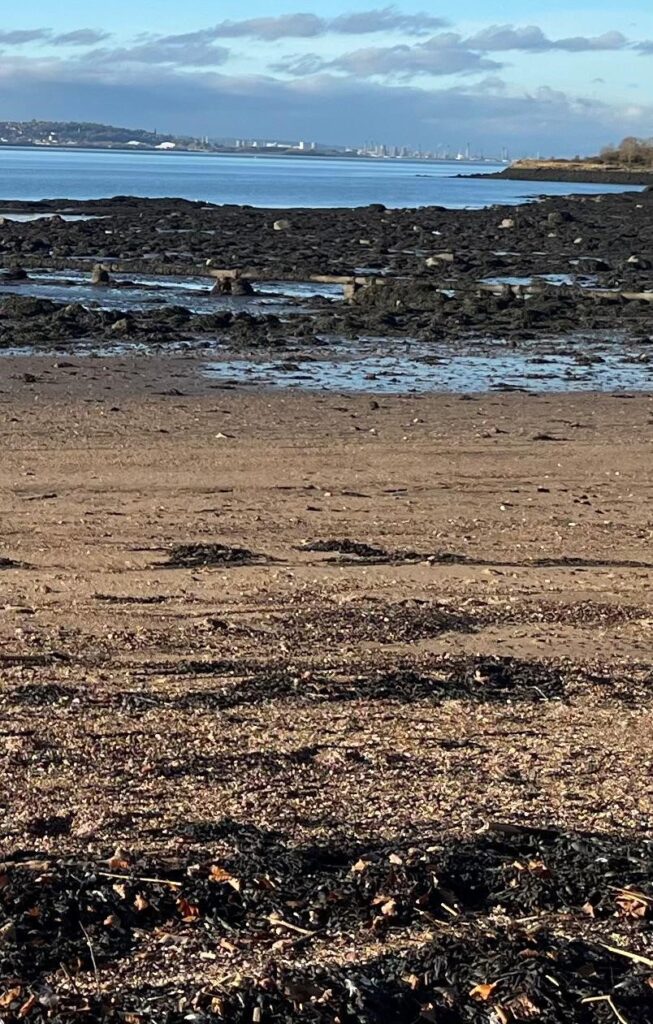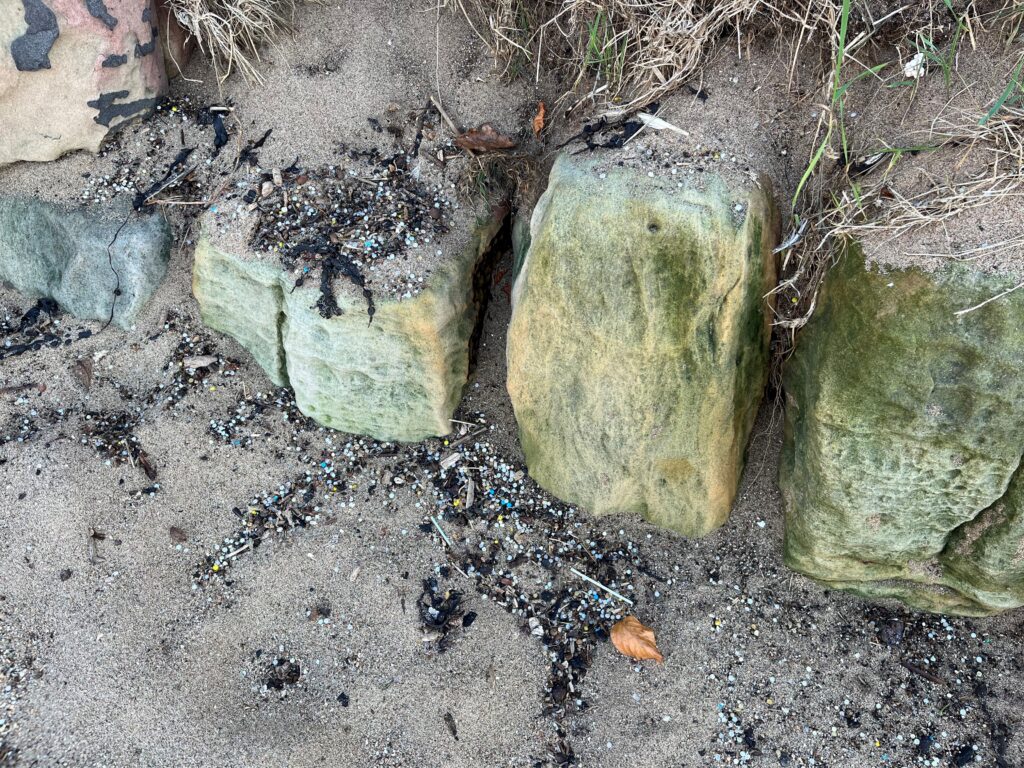
Nurdles: The tiny pellets polluting Scotland
Nurdles are small pellets of plastic that have been lost from the plastics supply chain and become environmental pollution, often making their way through waterways into seas and oceans. It takes about 600 pellets to make one plastic bottle and, globally about ten trillion nurdles are lost into the environment every year. That’s 16 billion bottles worth of plastic floating about in our waterways and littering our landscapes.
Nurdles are damaging to nature and wildlife in many ways. As they are mostly made from fossil fuels, they contribute to the climate crisis too.
Nurdle pollution is also directly harmful to Scottish coastal communities and the lack of action from industry, the Scottish Government and its agencies to take responsibility for addressing nurdles is a violation of the right of people in these communities to a clean, healthy and sustainable environment.
Nurdles are a significant source of plastic pollution
Their name may make them sound harmless but nurdles are, in fact, an extremely persistent and toxic form of plastic pollution. Chemical pollutants, including known carcinogens, hormone disruptors and toxins that can alter the nervous system, are attracted to nurdles and adsorbed by them like a sponge. Harmful bacteria have been found on their surface and the plastic they are made of may also contain harmful substances. This means that nurdles are tiny, concentrated cocktails of toxic pollution.
In Scotland, up to 8 billion plastic pellets are lost every year and nurdles have been found on almost three-quarters of beaches across the UK. Once they have entered the ocean, it is almost impossible to remove them. They persist for decades, sometimes breaking down into smaller microplastic pieces which, although less visible, are still an environmental hazard.

The impact of nurdle pollution on communities around the Firth of Forth
The Firth of Forth is a uniquely vulnerable part of Scotland’s nurdle story. Plastic pellets are transported along the Forth to and from the oil refinery complex in Grangemouth. Plastics production at Grangemouth, which makes up about a third of the UK’s entire plastic production, is estimated to produce 30-35 billion plastic pellets every day. The Forth is also lined with many other industrial sites using plastic pellets and chemicals to make products with chemicals having spilled into the water for decades. A quarter of Scotland’s population lives along its shores and millions of marine animals make it their home.

At Kinneil Nature Reserve near Bo’ness, nurdle hunt volunteers from Friends of the Earth Falkirk pick their way along the coast with the Ineos Petrochemical complex visible on the horizon. Passersby stop to talk – nurdles are a problem that many people here are aware of.

Nurdle hunters report their findings to the Great Nurdle Hunt, a project run by the charity Fidra to highlight the extent of nurdle pollution across the world. Groups are asked to categorise the number of nurdles found on a scale: 0, 1-30, 31- 100, 101-1000 and more than 1000. At Kinneil, it is easy to see that the nurdles greatly exceeds 1000 by eyesight alone. It is not expected that nurdle hunts should clean up the nurdles – there are too many and they are not recyclable. Rather, they are investigating the scale of the problem.

Across the Forth in North Queensferry, nurdle pollution can stop people using the beaches for normal activities. Locals conduct cleanup operations which last only until the next high tide as a seemingly never-ending source of nurdles are washed up and cover the beach again.
In Limekilns, a coastal town also on the North shores of the Forth, nurdles have polluted the area for so long they are embedded in the land around the shoreline. At every high tide, the sea erodes the land and historic nurdles break free and tumble onto the beach in their thousands. Local conservationist and biologist Joanna McFarlane says children have grown up seeing this pollution as if it’s a normal part of life, which she says is “totally unacceptable, no one accountable, no one has taken responsibility. What are we teaching our children? That you can treat the environment like this and get away with it? It’s time this changed”.
The failure of Operation Clean Sweep
The problem of nurdles has been recognised internationally by industry for decades. In 1991, Operation Clean Sweep, a voluntary, industry-led initiative, was set up with the goal of zero plastic pellet loss. Many of the world’s biggest plastics producers, including INEOS, Dow chemical, Dupont, Shell, ExxonMobil and Total, are members.
INEOS is an oil, gas and petrochemical conglomerate, headquartered in London. It operates the plastics production site in Grangemouth which is a key part in the plastics production chain linked with high levels of nurdle pollution in the Firth of Forth. INEOS is majority owned by billionaire Jim Radcliffe and generates about $65bn annually. The company joined Operation Clean Sweep in 2017, with Jim Radcliffe pledging to “do all [he] can” about plastic waste.
The solutions to nurdle pollution should be easy to implement, as many of them involve simple, practical measures such as requirements to store pellets below deck to reduce the risk of loss. One study estimated that implementing mandatory pellet loss prevention measures could reduce loss by 95%.
However, more than 30 years after it was set up, Operation Clean Sweep has been criticised by environmental groups for its failure to tackle pellet loss. Fidra, the UK charity which organises nurdle hunts, has raised concerns that whilst some big producers have signed up, across the UK overall sign up to the voluntary scheme remains low, with many companies yet to commit to the pledge. There is also a lack of independent and transparent auditing which makes it difficult to assess the scheme’s effectiveness. Other groups, including Client Earth, have gone as far as to label Operation Clean Sweep as nothing more than greenwash. This means that preventable nurdle pollution has not been stopped by this voluntary scheme.
Government has not done enough to protect communities
The Scottish Government has a Marine Litter Strategy which aims to remove existing litter and prevent new litter entering Scotland’s marine environment. It includes a plan for working with industry to develop ways of managing plastic pellets and the Scottish Government has been pushing for progress in this area. Much of this work centred on the development of a new British standard, PAS 510:2021, to manage plastic pellets in the supply chain and prevent their loss.
However, this standard is voluntary and the Scottish Government’s has not required companies to follow pellet prevention measures and so the pollution continues. Other aspects of pellet policy are unclear, for example, there is a lack of clarity around what should happen should a major incident such as a ship spill of pellets occur. The Scottish Government does not have a plan for managing existing nurdle pollution and the community groups most affected by nurdles are not considered in the Marine Litter Strategy, despite the removal of litter being part of its stated aim.

Last month, Environmental Standards Scotland, Scotland’s independent environmental watchdog, concluded their investigation into the Scottish Government’s Marine Litter Strategy. It recommended that the Scottish Government should take a more joined up approach to marine litter policy and legislation, including around plastic pellets.
A Freedom of Information request revealed that the Scottish Government does not know how many businesses operating in Scotland have implemented the new standard. In addition, the Scottish Government does not measure the environmental or social impacts of nurdle pollution. Without an understanding of what is being done to limit nurdle pollution or what the impacts are, it is impossible to create a meaningful plan to stop nurdle pollution and support those affected by it.
Despite the Scottish Government and its agencies, the Scottish Environmental Protection Agency (SEPA) and Zero Waste Scotland, being on the steering group which developed the plastic pellet standard, there are no requirements for businesses handling plastic pellets in Scotland to implement the standard. SEPA do not directly regulate plastic pellets or measure their impact on the environment. Since July 2021 when the standard was introduced, none of the projects which involve plastic pellets funded by Zero Waste Scotland were required to implement the standard.
The universal right to a clean, healthy environment
In 2022, the UN declared that everyone has the right to a clean, healthy and sustainable environment. The Scottish Government has said it will include this right in a new Human Rights bill, although progress towards this vitally important law has stalled. The law would include the right to non-toxic environments in which to live, work, study and play and mean that governments, councils and other public bodies would have legal obligations to protect and uphold our right to a healthy environment.
Nurdles are a violation of this right. They stop people, especially those who live in coastal areas around the Firth of Forth, where the pollution is most intense, from accessing clean water and land. Nurdles contaminate the environment with toxic pollution which is almost impossible to clean up. These communities deserve support to reduce the impact of decades of pollution.
Nurdles are a preventable harm – if companies have comprehensive pollution control measures in place and enforce them, the risk of nurdle pollution can be greatly reduced. However, the nurdles which already litter many Scottish beaches, are evidence that such measures have not been followed. Both industry and the Scottish Government could do more to support communities facing historic nurdle pollution and prevent further nurdle pollution occurring in Scotland.
Rather than cutting communities out the conversation, the people most affected by nurdles need to be at the heart of solutions to make sure their concerns are heard. The people conducting nurdle hunts year after year on the beaches they know and love deserve to be listened to.
The Scottish Government must recognise that, when working with industry, this group has a fundamental conflict of interested that compromises its position to provide effective solutions to pollution. Companies will not voluntarily take actions which limit their profits, and, as the failure of Operation Clean Sweep has shown, voluntary measures are insufficient and ineffective. The Scottish Government has a duty to protect its citizens, and it can do so by holding industry to account more for creating nurdle pollution in Scotland and supporting communities affected by nurdle pollution.
Acknowledgements
Many people helped in gathering the evidence and views presented here. I would like to thank: Norman Philip, Jo McFarlane, Jamie Clarkson from Fidra, Morag Campbell and Heather McFarlane from Fidra for their time, knowledge and support.
